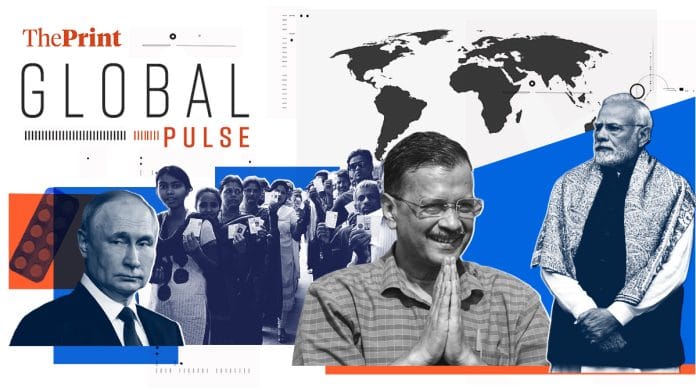New Delhi: Who will take over from Prime Minister Narendra Modi? That’s the question that The Economist asked in its latest article ‘Who could replace Narendra Modi?’
Soon after his release from jail, Delhi Chief Minister Arvind Kejriwal raised questions about the Bharatiya Janata Party’s (BJP) succession plan, suggesting that Union Home Minister Amit Shah would take over after Modi, now 73, turns 75 — the unwritten retirement age within the party. While both Shah and the BJP have dismissed this saying that the prime minister would complete his term, the speech has led to questions about who will succeed him to India’s top post.
The Economist lists three key contenders: Shah, one of BJP’s key political strategists, Uttar Pradesh Chief Minister Adityanath, who’s known for his Hindutva stance, and India’s current minister for highways and transport Nitin Gadkari, who enjoys the support of India Inc and BJP’s ideological fountainhead Rashtriya Swayamsevak Sangh (RSS).
“Another strong BJP victory, while giving Mr. Modi more leeway to delay his retirement, would perpetuate his personalisation of power. A disappointing result, meanwhile, could prompt calls for an earlier succession, intensifying the struggle among leading contenders. Either way, the transition will be fraught with risk,” the article concludes.
In his article ‘Unbearable’: Will 45C heatwaves affect who India chooses in election?’ in Al Jazeera, Bibhudatta Pradhan reports on how India’s soaring temperature is affecting its mammoth seven-phase Lok Sabha elections.
According to the report, experts are attributing the lower voter turnout to the heat. And while several parties are including environmental issues in their manifesto, climate change is still not an urgent electoral issue, the report says.
“There is a growing need to make this concern a more pressing election issue and elevate the discourse on climate change and encourage more concrete action and commitment at the policy level,” Aditi Madan, a postdoctoral fellow at the New Delhi-based Institute for Human Development, tells Pradhan.
A report ‘Is Russia’s show of solidarity with India over alleged murder plot on US soil ‘fishing in troubled waters’?’ in the South China Morning Post discusses the complex relationship that India shares with the US and Russia, particularly in light of the allegedly foiled plot to assassinate a radical Sikh leader Gurpatwant Singh Pannun.
According to the report by the newspaper’s senior correspondent Biman Mukherji, Russia’s show of solidarity stems from its strained ties with the West and is unlikely to disrupt ties between India and the US.
India will balance its relationship with both Washington and Moscow, the report says. “But Russia cannot match the economic heft of the West. Russia’s weaknesses have also become a problem because it is making it more difficult for India,” the report quotes Harsh Pant, a professor of international relations at King’s College London, as saying.
An opinion piece ‘India can be a real alternative to China in pharmaceuticals’ in Nikkei Asia discusses how the COVID-19 pandemic has brought to the fore the risks of depending heavily on a few countries, particularly China, for pharmaceuticals and medical products.
In the article, authors Delhi-based Gopal Nadadur, vice-president for South Asia at the strategic advisory firm The Asia Group, and Washington-based Sam Ide, the firm’s vice president for China, argue that with ongoing tensions between China and other countries such as India, Japan, and the US, there’s a push to diversify supply chains.
India supplies a significant portion of generic drugs and vaccines globally and is expanding its pharmaceutical sector, they argue. Although quality control has been a major issue due to past incidents of contaminated drugs, with continued reforms and international investment, India has the potential to become an alternative in the global pharmaceutical supply chain, the article says.
“India still has some ways to go in offering itself as a complete alternative to China but could get there with the government’s initiatives and more support from like-minded partners,” the authors conclude.
Also Read: How India’s ports are transforming, and Raghuram Rajan on ‘false choice’ of democracy vs prosperity
Blinken’s surprise visit to Kyiv, wildfire in Canada
As Russian forces made significant gains in the ongoing conflict in Ukraine, US Secretary of State Antony Blinken made a surprise trip to Kyiv and held President Volodymyr Zelensky. To know more, read this CNN article.
Authorities in the Canadian province of Alberta issued evacuation orders in Fort McMurray in the face of an approaching wildfire. Read this report on Al Jazeera to learn more.
Also Read: How Musk benefited from ‘diplomacy’ with Modi, Milei & Bolsonaro, and BJP’s Karnataka challenge






